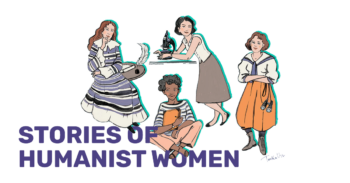 A new resource launched today by Understanding Humanism and Humanist Heritage puts four remarkable humanist women centre stage, with a booklet titled ‘Think for yourself, act for everyone’. Released to coincide with International Women’s Day, the resource celebrates four freethinking women who changed the world: writer George Eliot (1819–1880), journalist and explorer Florence Dixie (1855–1905), scientist Rosalind Franklin (1920–1958), and playwright and activist Lorraine Hansberry (1930–1965).
A new resource launched today by Understanding Humanism and Humanist Heritage puts four remarkable humanist women centre stage, with a booklet titled ‘Think for yourself, act for everyone’. Released to coincide with International Women’s Day, the resource celebrates four freethinking women who changed the world: writer George Eliot (1819–1880), journalist and explorer Florence Dixie (1855–1905), scientist Rosalind Franklin (1920–1958), and playwright and activist Lorraine Hansberry (1930–1965).
The stories were created by storyteller and humanist school speaker Isabelle King, and are accompanied by activities encouraging readers to explore themes of imagination, discovery, exploration, and activism. Through the lives of these pioneering figures, young people and educators are invited to think about how each woman turned her talents towards work for a better, fairer world – whether through literature, science, sport, or social activism.
The stories and activities are brought to life with specially created illustrations by Tonka Uzu. Small details point to the particular contributions of each woman, from Lady Florence Dixie’s binoculars to George Eliot’s quill and ink. This new booklet joins a collection of Humanist Heritage resources which can already be found on the Understanding Humanism website, exploring the history and impact of humanism in the UK.
More about the women
Women have often been overlooked in histories of humanism, despite playing key roles in the organised movement, and living rich and inspiring lives underpinned by humanist values. The four women featured in these stories and activities are powerful examples of the latter.
- George Eliot (Mary Ann Evans) was one of the most celebrated novelists of the Victorian era. An eloquent champion of the humanist approach, she wrote about ordinary people with empathy and understanding. Through this ‘Imaginative Freethinker’, readers are encouraged to think about how imagination and observation might support us to better understand each other.
- Lady Florence Dixie was a pioneering woman journalist, a world traveller, and an advocate of women’s football. She was also an outspoken freethinker, arguing particularly against the use of the Bible to oppress women. Through this ‘Exceptional Explorer’, the booklet asks how courage and adventure might contribute to happier lives.
- Rosalind Franklin was a groundbreaking scientist and humanist, whose work was crucial to the discovery of the structure of DNA. The life of this ‘Determined Discoverer’ is used to explore the value of curiosity to humanists, and the importance of determination.
- Lorraine Hansberry was a playwright and civil rights activist, whose 1959 play A Raisin in the Sun was the first drama by a black woman to be performed on Broadway. Hansberry rejected the idea of a god being given credit for human achievements, and used the character of Beneatha Younger to express this frustration. Prompts about this ‘Passionate Playwright’ ask how each of us can work for equality in the world, while celebrating our differences.
About the new resources, Director of Understanding Humanism Luke Donnellan said:
‘This resource brings to life the fantastic stories of these four amazing humanist women, each of whom changed the world in a significant way. Illustrating their influence on sport, science, activism, and the arts, it will provide parents and teachers with a way to explore with young people what it is that inspires and motivates humanists in their lives and so help them to better understand the history of humanist belief and action.’
Speaking about the stories in an interview with Humanists UK, Isabelle King commented:
‘It felt very exciting to introduce children to some figures from Humanist Heritage, particularly women who achieved great and interesting things. For example, Lady Florence Dixie challenged social conventions of the Victorian era by creating the first women’s football team. She did not think it was fair that women were not allowed to play football and showed tremendous courage and tenacity, paving the way for gender equality through this sport.
‘It has been fascinating to research the life’s work and achievements of these inspirational humanists who used their skills to help others. My hope was to make the stories lively and engaging, and for children to find this an interesting way to learn more about humanism.’
Notes:
For further comment or information, media should contact Humanists UK Humanist Heritage Coordinator Madeleine Goodall at heritage@humanists.uk.
Read more about the women featured in the resource on Humanist Heritage.
Similar stories:
- Humanist Heritage awarded Heritage Fund grant to bring humanist history to new audiences
- Exploring life’s biggest questions: interview with humanist school speaker Isabelle King
- Heroines of freethought: women of the early humanist movement
Humanists UK is the national charity working on behalf of non-religious people. Powered by 100,000 members and supporters, we advance free thinking and promote humanism to create a tolerant society where rational thinking and kindness prevail. We provide ceremonies, pastoral care, education, and support services benefitting over a million people every year and our campaigns advance humanist thinking on ethical issues, human rights, and equal treatment for all.
Understanding Humanism is Humanists UK’s education service. It aims to introduce young people to humanism as an example of a non-religious worldview. It provides teachers with the resources necessary to teach accurate, high-quality lessons about humanism, and assists them with the development of their own subject knowledge. The Understanding Humanism website offers information and services, including free school speakers who can work with teachers to broaden students’ understanding. Visit Understanding Humanism at understandinghumanism.org.uk.
